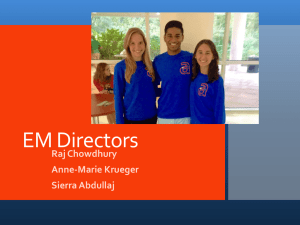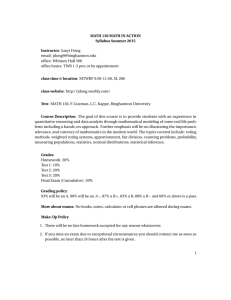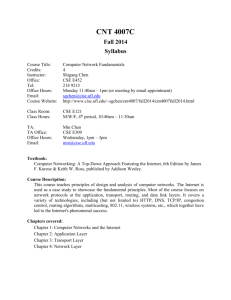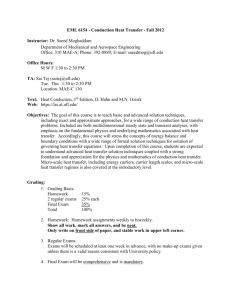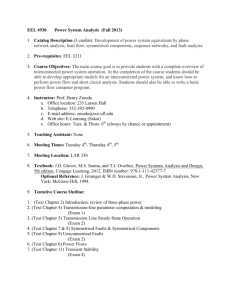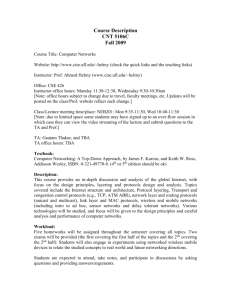Course Syllabus - University of Florida
advertisement
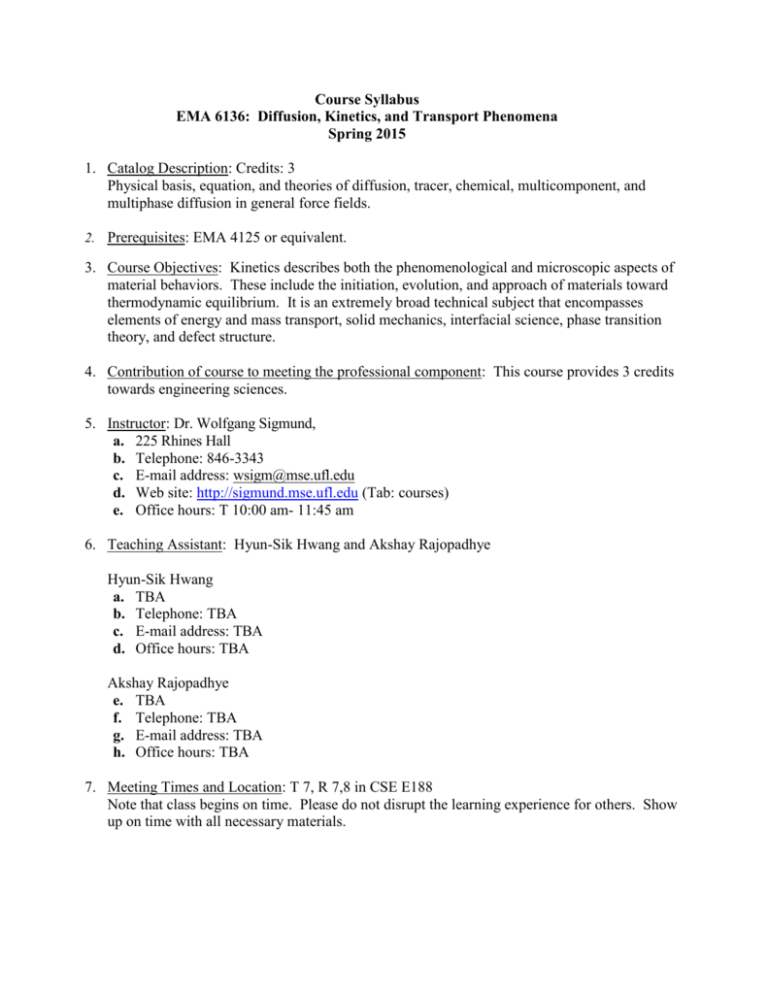
Course Syllabus EMA 6136: Diffusion, Kinetics, and Transport Phenomena Spring 2015 1. Catalog Description: Credits: 3 Physical basis, equation, and theories of diffusion, tracer, chemical, multicomponent, and multiphase diffusion in general force fields. 2. Prerequisites: EMA 4125 or equivalent. 3. Course Objectives: Kinetics describes both the phenomenological and microscopic aspects of material behaviors. These include the initiation, evolution, and approach of materials toward thermodynamic equilibrium. It is an extremely broad technical subject that encompasses elements of energy and mass transport, solid mechanics, interfacial science, phase transition theory, and defect structure. 4. Contribution of course to meeting the professional component: This course provides 3 credits towards engineering sciences. 5. Instructor: Dr. Wolfgang Sigmund, a. 225 Rhines Hall b. Telephone: 846-3343 c. E-mail address: wsigm@mse.ufl.edu d. Web site: http://sigmund.mse.ufl.edu (Tab: courses) e. Office hours: T 10:00 am- 11:45 am 6. Teaching Assistant: Hyun-Sik Hwang and Akshay Rajopadhye Hyun-Sik Hwang a. TBA b. Telephone: TBA c. E-mail address: TBA d. Office hours: TBA Akshay Rajopadhye e. TBA f. Telephone: TBA g. E-mail address: TBA h. Office hours: TBA 7. Meeting Times and Location: T 7, R 7,8 in CSE E188 Note that class begins on time. Please do not disrupt the learning experience for others. Show up on time with all necessary materials. 8. Required Textbooks and Software: 1. D.A. Porter, K.E. Easterling, and M.Y. Sherif, “Phase Transformations in Metals and Alloys,” 3rd Edition, CRC Press, Boca Raton, FL (2004). [ISBN 978-1-4200-6210-6] Reference later cited as ‘P&E.’ 2. M.E. Glicksman, “Diffusion in Solids: Field Theory, Solid-State Principles and Applications,” John Wiley & Sons, New York (2000). [ISBN 0-471-23972-0]. Reference later cited as ‘MEG.’ 9. Course website: Go to the UF Academic Technology website at: https://lss.at.ufl.edu/ 10. Course Outline: Topics 1. 1. Introduction: Purpose of the course, policies. 2. Thermodynamics and kinetics: Gibbs free energy; chemical potentials; thermal, mechanical, and chemical equilibria. Process driving forces and equilibrium; polymorphism; P-T diagrams; binary phase diagrams. Types of transitions in unary systems: Gibbs Phase rule, phase diagrams. Types of transitions: allotropic; order-disorder, etc. First-order phase transitions; bulk vs. interfacial considerations; rates of transition; kinetic resistances; metastability. 3.Diffusion: Gradients in composition, mass flux; Fick’s 1st law: component fluxes; diffusivity; solutions to the diffusion equation; Fick’s 2nd law; mass conservation; divergence of fluxes; boundary conditions; error function solution. Diffusional penetration: applications, diffusivity in isotropic and non-isotropic solids. Planar sources: thin film solution; tracer diffusion; solutions for infinite and semi-infinite systems; growth & dissolution of precipitates; quasi-static approximations: supersaturation. Boundary layers, and diffusion mechanisms in solids; interstitial and substitutional diffusion; vacancy diffusion. Dependences of diffusivity, defects and correlation. 4. Crystal Interfaces Surface energy and surface stress Interfaces and crystal growth Grain boundaries & interfaces Normal grain growth Reading Material (P&E Ch 1) Lecture estimate/ Exam 1 2-7 Exam 1 (P&E Ch.2), class 8-19 notes and (MEG Exam 2 Ch. 1-4) (P&E Ch.3-4) , 20-26 class notes and Exam 3 (MEG Ch. 3) 5. Solidification-Phase nucleation Precipitation and growth kinetics Grain mobility 6. Diffusional Transformations in solids. (P&E Ch 4-5), class notes and MEG Ch.7, 9) 27-36 Exam 4 11. Attendance: Attendance in class is important. Students are responsible for material presented in lectures, reading assignments, homework, and special distributed notes. Textbooks are available for purchase at the Reitz Union Bookstore and on-line sources. 12. Homework: Homework will be assigned approximately on biweekly basis and is usually due back the following week. The purpose of homework is to give students an opportunity to evaluate and apply their knowledge. Students may collaborate on homework; however, the actual submitted assignment must represent your own work and preparation. Note: Homework in its entirety must be word processed on your computer. For some problems you will require a suitable math package with graphing capability (e.g., Excel, MatLab, or others). Homework needs to be submitted online on Sakai. Email is not acceptable for submission of homework. Hard copies are also not accepted. Homework will be evaluated on the following basis: Excellent work: 100 Assignment acceptable: 85 Homework submitted (showing effort): 70 Note - late homework is not accepted: 0 13. EDGE Student Submission Policy – EDGE students must submit all homework assignments electronically by the given deadlines. Exams must be received no more than five days after the in-class exam date. Please scan documents as a pdf and submit them electronically or via fax. You must follow-up and verify that exams are received in their entirety by the instructor. If problems occur, they must be reported early. No credit will be given for late submissions. 14. Grading: Four exams are tentatively planned. Exams usually consist of short answer questions to evaluate your familiarity with the course content and some longer problems designed to test your ability to apply concepts to new situations, i.e. to promote critical thinking. Unless otherwise informed, one sheet of prepared personal notes may be used to assist you in completing examinations. In some cases, open-book or take-home exams may be given, and the students will be informed ahead of time. Exam work must be individual; collaboration is never allowed. Observations of cheating will be promptly reported by the exam proctor. Please see UF’s statement on academic honesty. https://www.dso.ufl.edu/sccr/process/studentconduct-honor-code/ Homework/Class activities* 20% (10% each) 4 exams 80% (20% each) NOTE: Optional comprehensive final exam (40%, replaces two lowest exam scores). * indicates class activities for in-class students only. Online only students (EDGE and others) will receive 20% on homework. This course follows current UF grading policies for assigning grade points. Grading Scale: Percentage Letter Grade ≥92 A ≥88 A- ≥84 B+ ≥80 B ≥76 B- ≥72 C+ ≥68 C ≥65 C- ≥62 D+ ≥59 D ≥56 D- <56 E “In order to graduate, graduate students must have an overall GPA and an upper-division GPA of 3.0 or better (B or better). Note: a B- average is equivalent to a GPA of 2.67, and therefore, it does not satisfy this graduation requirement. For more information on grades and grading policies, please visit: http://gradcatalog.ufl.edu/content.php?catoid=5&navoid=1054#grades 15. Make-up Exam and Late Submission Policy: No make-up exams will be given. Late homework assignments, term papers, and exams will not be graded under any circumstances. If you miss one exam, you will receive 0 points for this exam. However, the two lowest exam scores can be replaced if you elect to take the comprehensive final exam. 16. Honesty Policy – All students admitted to the University of Florida have signed a statement of academic honesty committing themselves to be honest in all academic work and understanding that failure to comply with this commitment will result in disciplinary action. This statement is a reminder to uphold your obligation as a UF student and to be honest in all work submitted and exams taken in this course and all others. Note that failure to comply with this commitment will result in disciplinary action compliant with the UF Student Honor Code Procedures. See https://www.dso.ufl.edu/sccr/process/student-conduct-honor-code/ 17. Accommodation for Students with Disabilities: – Students Requesting classroom accommodation must first register with the Dean of Students Office. That office will provide the student with documentation that he/she must provide to the course instructor when requesting accommodation. UF Counseling Services –Resources are available on-campus for students having personal problems or lacking clear career and academic goals. The resources include: UF Counseling & Wellness Center, 3190 Radio Rd, 392-1575, psychological and psychiatric services. ·http://www.counseling.ufl.edu/cwc/ Career Resource Center, Reitz Union, 392-1601, career and job search services. http://www.crc.ufl.edu/ 18. Software Use: All faculty, staff and student of the University are required and expected to obey the laws and legal agreements governing software use. Failure to do so can lead to monetary damages and/or criminal penalties for the individual violator. Because such violations are also against University policies and rules, disciplinary action will be taken as appropriate. We, the members of the University of Florida community, pledge to uphold ourselves and our peers to the highest standards of honesty and integrity. https://software.ufl.edu/ 19. Syllabus Changes: I reserve the right to make changes in the syllabus as needed. Any changes will be clearly announced on e-learning and in class. Syllabus version 1, Date: December 15, 2014
